



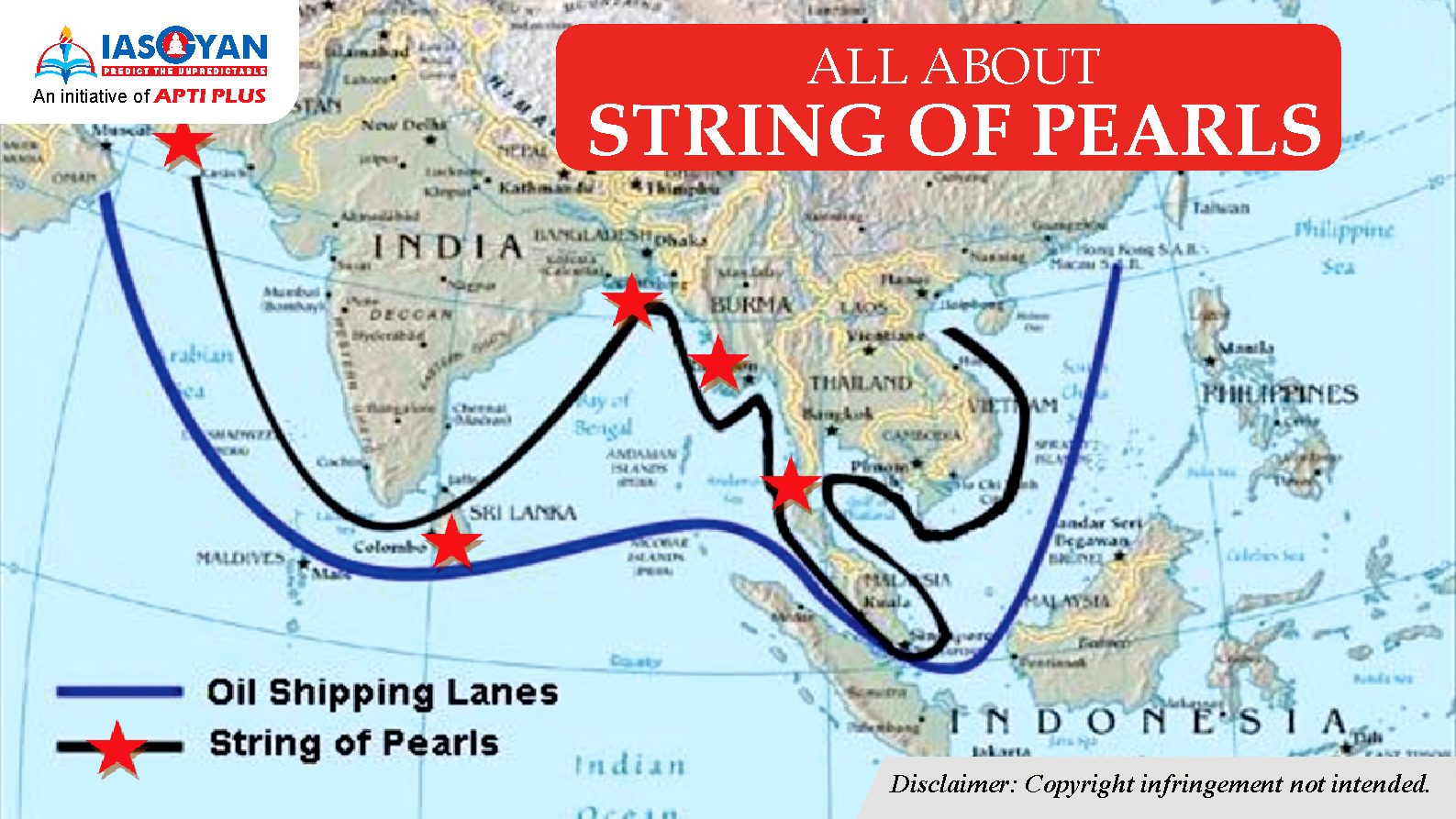
The String of Pearls is a geopolitical hypothesis proposed by United States political researchers in 2004.
‘String of Pearls’ refers to a geopolitical theory to the network of Chinese intentions in India Ocean Region (IOR).
Precisely, it refers to the network of Chinese military and commercial facilities developed by China in countries falling on the Indian Ocean between the Chinese mainland and Port Sudan.
The doctrine has been discussed and debated for years and India’s ‘Look East Policy’ was always seen as an answer to Chinese ‘String of Pearls’.
But first, the China-Pakistan Economic Corridor (CPEC) and now its macro form of One Belt One Road (OBOR) under which China will construct various land and maritime trade routes are also seen as a part of China’s larger military ambition.
India has already been encircled by Chinese military and commercial facilities and if, Chinese naval base comes up on Pakistan soil, that’s going to be the possible last cog in the chain of pearls encircling India.
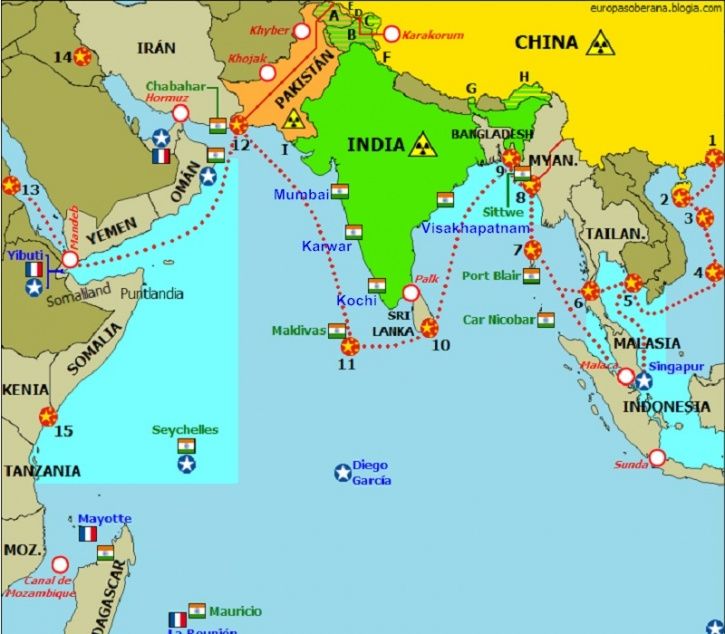
Though similar military and commercial facilities have been developed by China to encircle Japan and other American allies as well, since our concern is India, we are discussing the Chinese presence in IOR which might prove costly for India at the time of conflict with China.
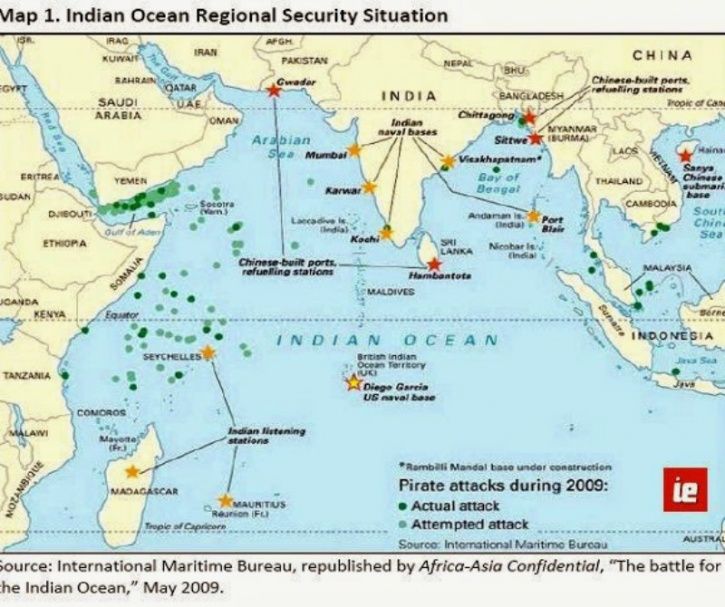
The Indian Ocean sees nearly 60 per cent of the trade which includes the trade of oil from the oil fields of the Middle East. And 80 per cent of China’s oil imports pass through the Strait of Malacca. Therefore, Strait of Malacca is indispensable for China until it develops alternative routes.
Therefore, China is keen to develop friendly relations with countries like Malaysia and Singapore which surround the Malacca Strait.
India has a strategic hold on Malacca Strait and in past as India had threatened to block Malacca Strait when China was mulling to help Pakistan in 1971 war.
During the Kargil conflict in 1999, India had choked supply to Pakistan by using its navy-practically blocking the Karachi port. China is said to have developed a naval base near Strait of Malacca on Cocos Keeling Island, which is a distant part of Australia.
China has the presence in Myanmar’s Kyaukpyu port. The port situated in the Bay of Bengal has given China access to have a commercial Maritime facility which can be used as a military facility at the time of conflict. China has invested a lot and 2400 km gas pipeline connecting Kyaukyu and Kunming is an example of it.
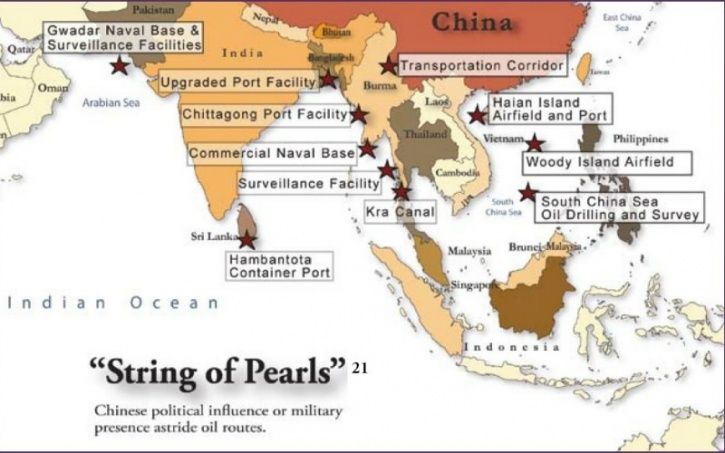 Another main Chinese presence in close vicinity to Indian shores are at Coco Islands. Coco Islands are situated north of Andaman and Nicobar Islands and strategically extremely important at the times of conflict. China is reportedly having a military base there as well.
Another main Chinese presence in close vicinity to Indian shores are at Coco Islands. Coco Islands are situated north of Andaman and Nicobar Islands and strategically extremely important at the times of conflict. China is reportedly having a military base there as well.
China has developed the port of Chittagong which again gives it a station to be used in the heart of the Bay of Bengal. China has invested a lot in Bangladesh and both Bangladesh and Myanmar are important points of OBOR’s sub-project, Bangladesh-China-India-Myanmar (BCIM). China once again has been pushing Bangladesh to allow a naval base near Chittagong.
Though India has robust relations with Sri Lanka for centuries, China has found its feet in Sri Lankan soil as well. The Chinese company has developed a port Hambantota, in the Southern-eastern side of Sri Lanka and the Sri Lankan government has also allowed the control of it to a Chinese company.
The previous Rajapakshe government had allowed Chinese to build this port and it was likely to allow China to build a naval base here. But the Rajapakse government was ousted in 2015 election and the present Sirisena government has cordial relations with India, which seems to have given a jolt to the Chinese plans.
Recently, the Sri Lankan government had rejected Chinese request of allowing one of its nuclear submarine dockings at Hambantota.
Pakistan- India relations require no introduction and China is Pakistan all weather ally. Therefore, Pakistan has always been China’s tool to keep India in check. The Gwadar Port developed by China for the purpose of CPEC is just the tip of the iceberg as the political pundits believe that China will not only assist Pakistan Navy through Gwadar port but would also launch offensive using this port in the scenario of a Sino-Indian conflict.
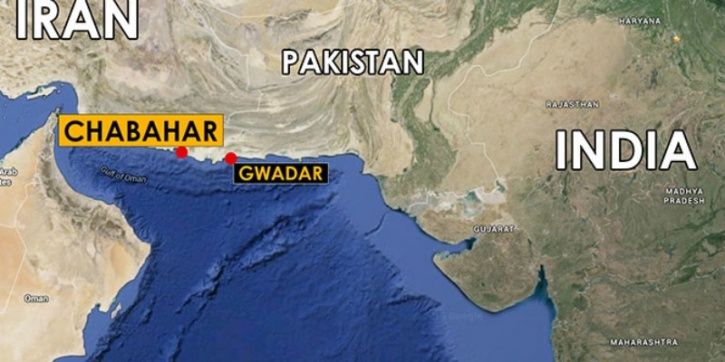 And now Pentagon has come up with a report that China may come up with a full-fledged naval base in Pakistan which again speaks volumes about Chinese ambitions in IOR.
And now Pentagon has come up with a report that China may come up with a full-fledged naval base in Pakistan which again speaks volumes about Chinese ambitions in IOR.
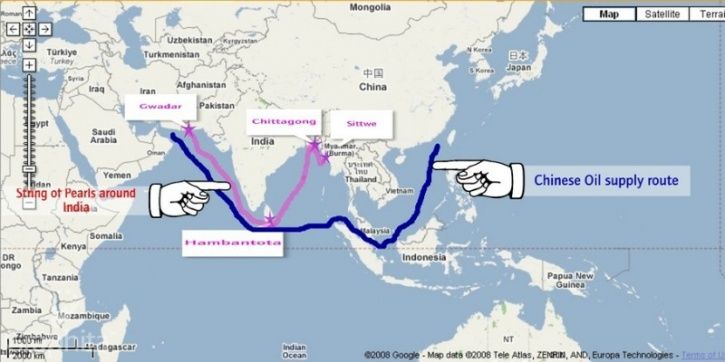 China hasn’t limited itself to lure the countries encircling India, but it has also made its presence felt on the African coast and the Middle East. China is said to have a powerful presence on the African coast of India ocean in Sudan and Kenya while it’s now building a military base in Djibouti to counter the increase American footprint in the Middle-East and IOR.
China hasn’t limited itself to lure the countries encircling India, but it has also made its presence felt on the African coast and the Middle East. China is said to have a powerful presence on the African coast of India ocean in Sudan and Kenya while it’s now building a military base in Djibouti to counter the increase American footprint in the Middle-East and IOR.
Apart from the Look East policy through which India has been trying to improve relations with China Southern-Eastern neighbours like Taiwan, South Korea, Philippines and Japan, India has been trying t improve its relationship with its neighbours so that they don’t go and sit in the lap of China.
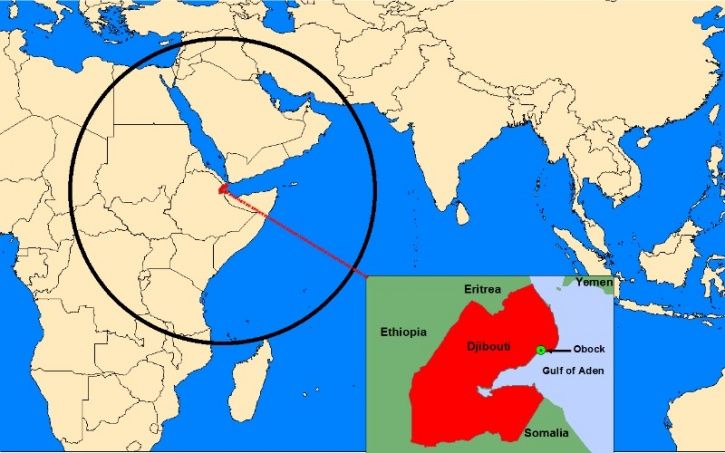 To counter Chinese influence in Myanmar, India has recently extended over USD 1.75 billion in grants and credit to Myanmar. Prime Minister Narendra Modi has recently visited Bangladesh and also received his counterpart in New Delhi. All these moves are seen as key to counter China. India-Bangladesh is also likely to develop deep sea military infrastructure in Sonadia.
To counter Chinese influence in Myanmar, India has recently extended over USD 1.75 billion in grants and credit to Myanmar. Prime Minister Narendra Modi has recently visited Bangladesh and also received his counterpart in New Delhi. All these moves are seen as key to counter China. India-Bangladesh is also likely to develop deep sea military infrastructure in Sonadia.
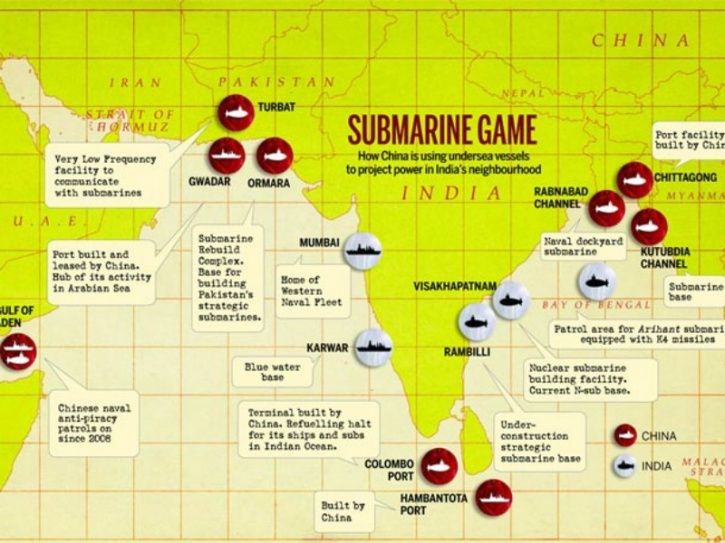 In order to counter China’s Gwadar move, India has made deal with Iran and now India is developing Chabahar Port in Iran which is even more crucial than Gwadar as it’s located on the mouth of Hormuz strait from where oil trade from the oil fields in Saudi Arabia, Iran, Kuwait, Oman, Qatar and UAE takes place.
In order to counter China’s Gwadar move, India has made deal with Iran and now India is developing Chabahar Port in Iran which is even more crucial than Gwadar as it’s located on the mouth of Hormuz strait from where oil trade from the oil fields in Saudi Arabia, Iran, Kuwait, Oman, Qatar and UAE takes place.
India has also invested a lot diplomatically in countries like Turkmenistan, Uzbekistan, Kyrgyzstan, Kazakhstan and Mongolia - all surrounding China. Besides, India has good old friends in Japan, South Korea and Russia.
© 2024 iasgyan. All right reserved